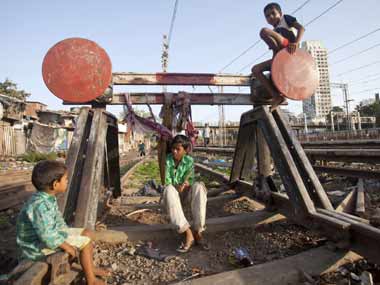There’s almost a Dickensian twist to this story. “Consumer rights activists and auto union leaders allege that a group of children, aged 12 to 15 years, and youths were involved in selling wire seals for ’tampered’ meters for Rs 150 to Rs 200 right under the noses of RTO officials at the meter testing tracks in the suburbs. The RTO officials have denied the charge, saying no such thing happened and that official seals were given only to bona fide drivers and who had passed the meter test. The seal was provided by the department free of cost,” finds The Times of India. And this is the silver lining on the cloud. Hindustan Times says “Of the 10,181 minors found on Mumbai railway stations between 2006 and 2011, 9,056 children have been reunited with their families so far.” [caption id=“attachment_127876” align=“alignleft” width=“380” caption=“Of the 10,181 minors found on Mumbai railway stations between 2006 and 2011, 9,056 children have been reunited with their families so far. Reuters”]  [/caption] “As soon as a duty officer spots a child who appears lost or if a commuter brings a child to us, we immediately issue wireless messages across the entire state to intercept any reports about missing children. The children, meanwhile, are taken to observation rooms that take care of them,” said ASI G Pathan of Andheri Railway police, who specially deals with cases of lost children. More details here. Autorickshaw drivers and owners received a blow. “Auto union leaders, who are opposed to the introduction of electronic meters, gave a live demo on meter tampering to four consumer rights activists at Bandra-Kurla complex on Wednesday afternoon. Mumbai Grahak Panchayat chairman Shirish Deshpande, who is also on the state committee on electronic meters, was “doubly convinced” after the demo that electronic meters should be installed in all autos in Mumbai. This came as an embarrassment for the auto union leaders, who were trying to convince Deshpande and three other activists that electronic meters can be easily tampered with,” says a Times of India story. There’s some action on the terrorism prevention front. “All roads leading to the Bombay Stock Exchange (BSE) building at Fort have been temporarily closed for vehicular traffic. This move comes after the Mumbai Police had advised all vital organisations in the city to beef up security in the wake of the July 13 the serial blasts at Zaveri Bazaar, Opera House and Kabutarkhana in Dadar,” says DNA. Mumbaikars will have a quieter commute on local trains. “At first it was the bhajan mandals in the local trains and now, loud mobile ring tones and songs have been contributing to the high level of noise pollution in the city’s local trains. Irresponsible behaviour by youth, college students and the middle-aged commuters, as they play songs loudly on mobile phones in trains has irked fellow commuters.The Western Railway has taken up the issue and has started appealing to the commuters to refrain from disturbing others by playing songs,” says DNA. Yes, the Worli-Haji Ali link will come up. “Reiterating his interest in setting up a ring road to decongest Mumbai, the CM said the Worli-Haji Ali sea link was part of the ring road plan and will not be shelved. He said changes are likely to the concession agreement with the Reliance-Hyundai consortium,” says the Times of India. The Times of India highlights the rot in the BMC. “The civic corporation has spent over Rs 450 crore on repairs and rehabilitation of water pipelines in the last two years and detected about 67,000 leakages in the same period. However, a look at civic data on the status of leakages shows that there has hardly been any improvement on the ground. The data validates what experts and citizens have been saying for a long time—despite huge sums of money being pumped in, the civic body has been unable to curb the problem. From September 2009 to September 2011, the BMC spent a total of Rs 117.39 crore on repairs of pipelines and Rs 333.98 crore on their replacement,” the paper says.
Despite all the odds, there is still hope in Mumbai. Of the 10,181 minors found on Mumbai railway stations between 2006 and 2011, 9,056 children have been reunited with their families so far.
Anant Rangaswami was, until recently, the editor of Campaign India magazine, of which Anant was also the founding editor. Campaign India is now arguably India's most respected publication in the advertising and media space. Anant has over 20 years experience in media and advertising. He began in Madras, for STAR TV, moving on as Regional Manager, South for Sony’s SET and finally as Chief Manager at BCCL’s Times Television and Times FM. He then moved to advertising, rising to the post of Associate Vice President at TBWA India. Anant then made the leap into journalism, taking over as editor of what is now Campaign India's competitive publication, Impact. Anant teaches regularly and is a prolific blogger and author of Watching from the sidelines. see more


)
)
)
)
)
)
)
)
)



